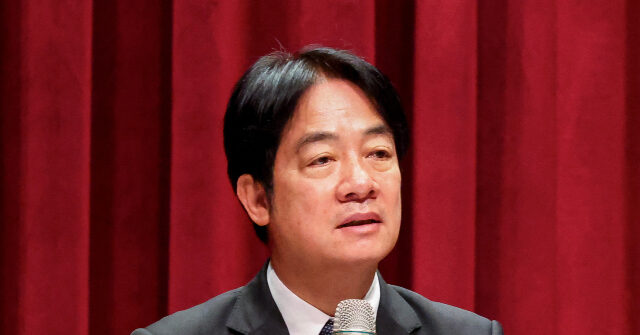Taiwanese President William Lai Ching-te on Sunday proposed zero tariffs, lower trade barriers, and more investment in the United States instead of retaliating against President Donald Trump’s tariff increases.
President Trump’s tariff announcement on Wednesday included 32 percent on all Taiwanese exports except semiconductors, which are Taiwan’s most celebrated and economically significant product.
Trump had threatened in March to include Taiwanese semiconductors on his tariff list, because he said Taiwan “stole” the industry from America with unfair trade practices.
“They stole it from us. They took it from us, and I don’t blame them. I give them credit. I blame the people that were sitting in this seat because they allowed it to happen,” Trump said in March.
The president’s position on Taiwanese semiconductors softened a little after the island’s biggest chipmaker, TSMC, pledged to spend $100 billion on five new semiconductor factories in Arizona over the next four years.
Officials in Taipei were stunned when Trump slapped 32-percent tariffs on everything except semiconductors last week. Taiwanese cabinet spokeswoman Michelle Lee called the tariffs “deeply unreasonable” and “highly regrettable.”
“The surge in US demand for Taiwan’s ICT products reflects Taiwan’s significant contribution to the US economy and national security, yet Taiwan is now being hit with high tariffs. This decision does not accurately reflect the trade and economic situation between Taiwan and the U.S.,” she said.
Lee pointed to fast-growing demand for semiconductors as the reason for Taiwan’s trade imbalance with the United States, rather than unfair trade practices. She also noted that Trump’s trade war with China in his first term prompted many Taiwanese companies to move their factories from China back home. This caused production on Taiwanese soil, and export volume, to increase considerably.
Taiwan’s trade surplus with the United States grew to $73.9 billion in 2024, giving it the seventh-highest U.S. trade deficit in the world. Trade deficits were a major factor in the formula used by the Trump administration to determine tariff increases.
“The methodology, scientific basis and trade rationale behind these tariffs remain unclear,” Lee said.
President Lai promised a response from his administration “as soon as possible,” including “the strongest possible support to industry” in the name of “economic stability.”
That response came on Sunday with an offer to establish a free trade relationship with the United States, and a promise that Taiwan would not take any retaliatory action.
“Tariff negotiations can start with ‘zero tariffs’ between Taiwan and the United States, with reference to the U.S.-Canada-Mexico free trade agreement,” Lai said. He also pledged to remove non-tariff barriers to American exports.
“Taiwan has no plans to take retaliatory tariff action in response to the United States’ ‘reciprocal tariffs.’ Investments by Taiwanese companies in the U.S. will also proceed without any changes, as long as they align with our national interests,” he said.
“In the future, in addition to TSMC’s increased investment, other industries, such as electronics, information and communications, petrochemicals, and natural gas will be able to increase investment in the U.S. and deepen Taiwan-U.S. industrial cooperation,” he added.
Lai said his cabinet is already deliberating what the first major new purchases from the United States will be. He said every one of those ideas would be “actively pursued.”
Lai told his constituents to remember how they have “been able to turn crises into opportunities, transforming the Taiwanese economy into a new and more resilient one.” He suggested another such crisis, and opportunity, was at hand.
The opposition Kuomintang (KMT) party criticized Lai for being too eager to accommodate President Trump, and said his concessions risked giving away Taiwan’s “silicon shield.”
KMT said Lai’s response to Trump was too weak and slow, and he was not offering enough support to Taiwanese companies that could suffer major losses from the tariffs.
Industry analysts warned that even though semiconductors were excluded from Trump’s tariff list, the other tariffs could have a “spillover effect” by hitting other companies that supply and service chipmakers with higher costs.
“The government must figure out a supplementary package to help businesses sustain the next four years,” said Hudson Institute senior fellow and former KMT lawmaker Jason Hsu.
Read the full article here


